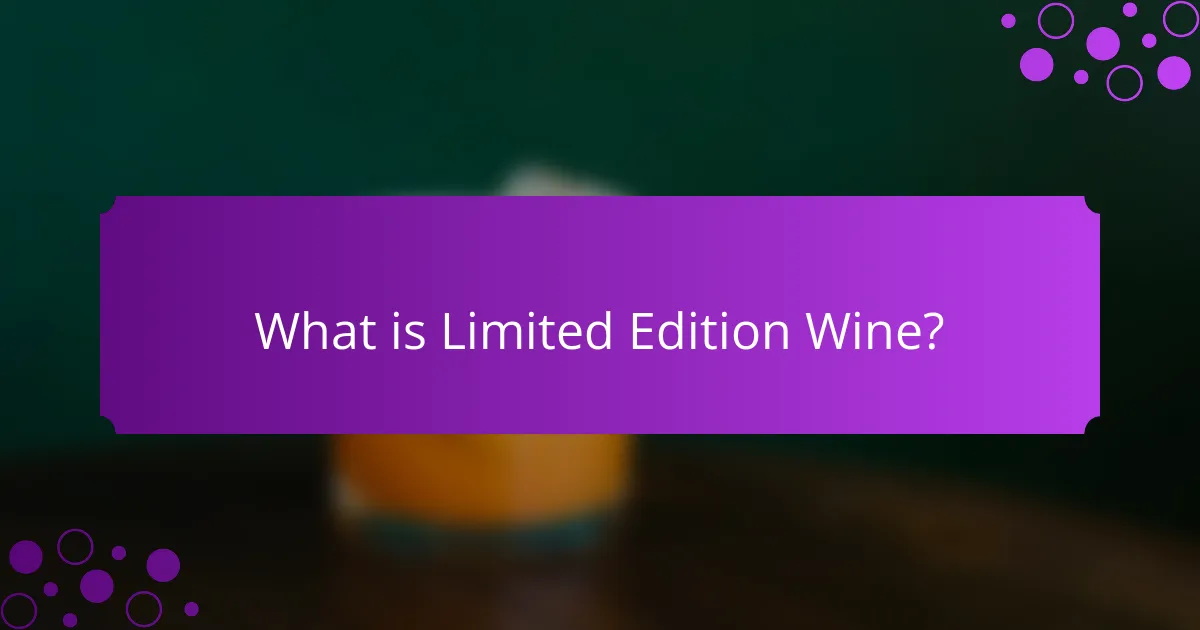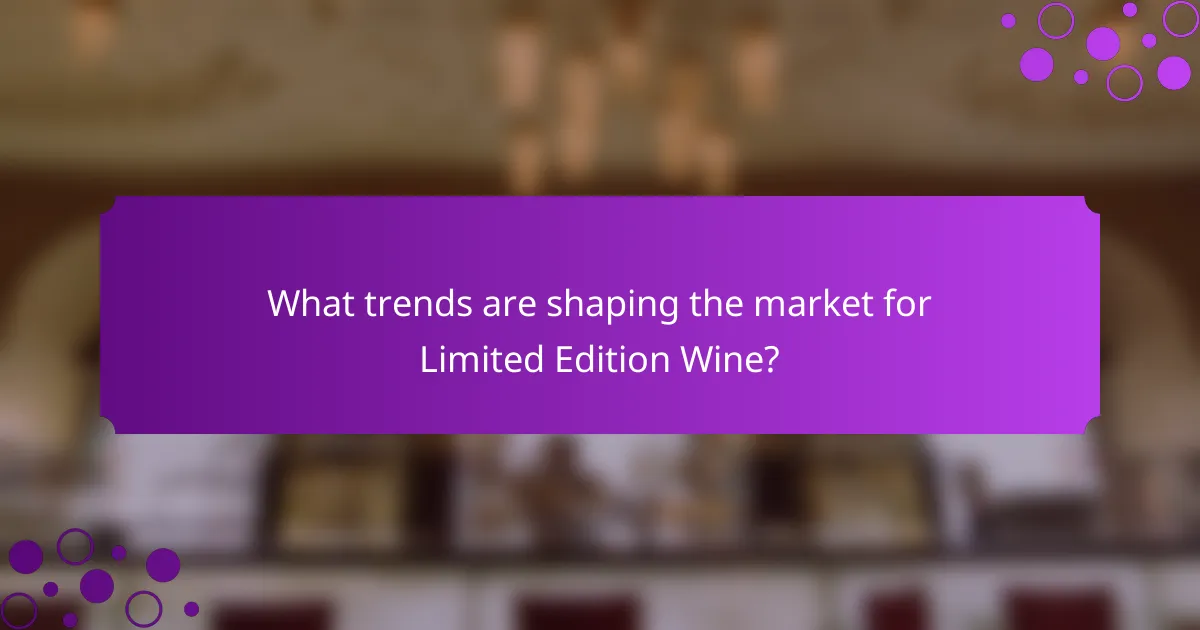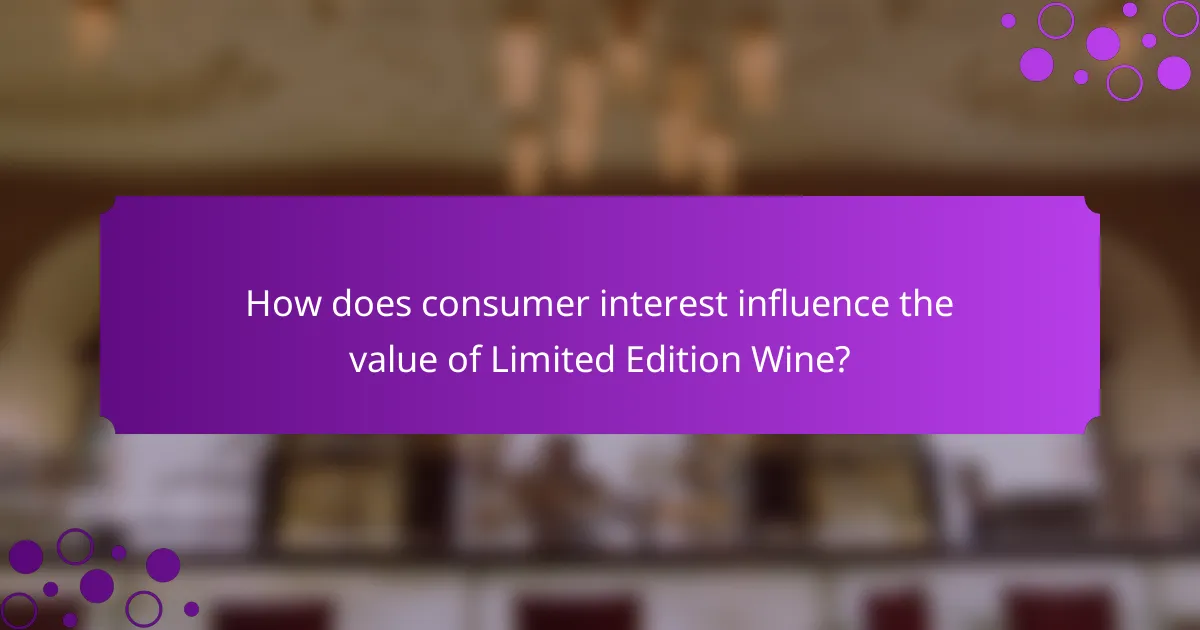
What is Limited Edition Wine?
Limited Edition Wine refers to wines produced in restricted quantities, often to celebrate a specific event or vintage. These wines are typically crafted with unique characteristics that distinguish them from standard offerings. Limited Edition Wines may feature special labels, unique blends, or specific aging processes. They are often sought after by collectors and enthusiasts due to their rarity. The production of such wines can be influenced by factors like regional terroir or innovative winemaking techniques. Their limited availability can drive higher demand and market value. In 2021, the global market for limited edition wines was valued at approximately $2 billion, reflecting their growing popularity among consumers.
How is Limited Edition Wine defined in the market?
Limited Edition Wine is defined in the market as a wine produced in limited quantities, often with unique characteristics. This exclusivity typically enhances its desirability among consumers. Limited Edition Wines may feature special blends, unique packaging, or specific vintage years. They are often released to commemorate events or collaborations. The market recognizes these wines for their rarity and the potential for increased value over time. According to a report by Wine Intelligence, limited edition offerings can drive consumer interest and loyalty. This trend reflects a growing consumer preference for unique and collectible products in the wine industry.
What characteristics distinguish Limited Edition Wine from regular wine?
Limited Edition Wine is distinguished from regular wine by its exclusivity, production methods, and packaging. Limited Edition Wines are produced in smaller quantities, often resulting in unique flavor profiles. These wines may utilize rare grape varieties or specific aging techniques that are not commonly found in regular wines. The labeling and packaging of Limited Edition Wines are often more elaborate, enhancing their perceived value. Additionally, these wines may be tied to specific events or collaborations, adding to their uniqueness. The limited availability creates a sense of urgency among consumers, driving demand and often increasing market value.
Why do producers create Limited Edition Wines?
Producers create Limited Edition Wines to enhance exclusivity and appeal to collectors. Limited editions often feature unique blends or special packaging, attracting consumers seeking distinct experiences. This strategy can drive higher prices and increase brand prestige. According to a 2021 report by the Wine Market Council, limited releases can boost sales by up to 30%. The rarity of these wines creates urgency among buyers, further fueling demand. Additionally, producers can showcase their craftsmanship through these special releases. This approach helps to differentiate their offerings in a competitive market.
What role does scarcity play in the value of Limited Edition Wine?
Scarcity significantly increases the value of Limited Edition Wine. When a wine is produced in limited quantities, it creates a perception of exclusivity. This exclusivity drives demand among collectors and connoisseurs. As demand rises and supply remains low, prices tend to increase. Historical data shows that limited releases often appreciate in value over time. For example, certain Bordeaux wines released in small batches have seen price increases of over 200% in a decade. Hence, scarcity is a critical factor influencing market value in the wine industry.
How does limited availability influence consumer demand?
Limited availability increases consumer demand by creating a perception of scarcity. When products are perceived as rare, consumers often feel a sense of urgency to purchase. This urgency can lead to higher willingness to pay. Studies show that scarcity can enhance the perceived value of a product. For example, a report by the Journal of Consumer Research indicates that limited edition items often sell out quickly due to heightened consumer interest. Additionally, limited availability can foster exclusivity, making consumers feel part of a select group. This exclusivity can drive demand further, particularly in luxury markets like limited edition wine.
What psychological factors contribute to the allure of Limited Edition Wines?
Limited Edition Wines attract consumers due to several psychological factors. Scarcity creates a sense of urgency, making consumers desire what is perceived as rare. This phenomenon is linked to the scarcity principle in psychology, where limited availability increases perceived value. Exclusivity enhances social status, as owning such wines can signify wealth and sophistication. The concept of social proof also plays a role; consumers may be influenced by others’ interest in these wines. Emotional connection is another factor; unique wines often evoke memories or experiences that enhance their appeal. Collectibility drives interest, as consumers may view these wines as investments. Overall, these psychological factors significantly contribute to the allure of Limited Edition Wines.

What trends are shaping the market for Limited Edition Wine?
The market for Limited Edition Wine is shaped by several key trends. Increasing consumer interest in unique and exclusive products drives demand. Limited editions often feature distinctive packaging and storytelling, enhancing their appeal. Sustainability practices are also influencing production methods, attracting environmentally conscious consumers. The rise of online wine sales has made limited editions more accessible. Additionally, collaborations with artists and designers create buzz and elevate brand visibility. Social media marketing plays a crucial role in promoting these exclusive offerings. Collectibility and investment potential further boost consumer interest in limited edition wines.
How are consumer preferences evolving in the wine industry?
Consumer preferences in the wine industry are evolving towards sustainability and unique experiences. Many consumers now prioritize organic and biodynamic wines. This shift reflects a growing awareness of environmental issues. Additionally, there is an increasing interest in limited edition and artisanal wines. Consumers seek distinct flavors and stories behind each bottle. Data shows that millennials and Gen Z are driving this trend. They value authenticity and are willing to pay more for unique offerings. Furthermore, wine subscription services are gaining popularity. These services cater to consumers looking for curated selections and convenience. Overall, the wine industry is adapting to meet these changing preferences.
What demographic shifts are influencing Limited Edition Wine purchases?
Younger consumers are increasingly influencing Limited Edition Wine purchases. Millennials and Gen Z are showing a preference for unique, high-quality products. Research indicates that these demographics value experiences over material goods. They are willing to pay a premium for exclusive offerings. Additionally, there is a growing interest in sustainability among younger buyers. This shift drives demand for limited editions that prioritize eco-friendly practices. According to a 2022 study by Wine Intelligence, 60% of younger consumers prefer wines with unique stories. This trend indicates a significant change in purchasing behavior.
How are sustainability concerns affecting Limited Edition Wine production?
Sustainability concerns are significantly impacting Limited Edition Wine production. Producers are increasingly adopting eco-friendly practices. This includes organic farming and reduced chemical usage. Many wineries are also focusing on water conservation techniques. They are implementing renewable energy sources like solar power. Packaging is evolving to use recyclable materials. According to a 2022 study by Wine Intelligence, 75% of consumers prefer sustainable wines. This shift is driving producers to enhance their sustainability credentials. As a result, Limited Edition Wines often highlight their sustainable practices on labels.
What technological advancements are impacting the Limited Edition Wine market?
Technological advancements significantly impact the Limited Edition Wine market. Innovations in precision viticulture enhance grape quality and yield. Advanced sensors and drones monitor vineyard conditions in real-time. Data analytics optimize irrigation and pest management strategies. Blockchain technology improves traceability and authenticity of limited edition wines. Smart labeling provides consumers with detailed information about the wine’s origin and production. E-commerce platforms facilitate direct-to-consumer sales, expanding market reach. Finally, augmented reality enhances consumer engagement through interactive experiences. These advancements collectively drive efficiency and consumer interest in Limited Edition Wines.
How do digital marketing strategies enhance consumer engagement with Limited Edition Wines?
Digital marketing strategies enhance consumer engagement with Limited Edition Wines by utilizing targeted campaigns and personalized content. These strategies leverage social media platforms to create buzz around exclusive releases. Engaging storytelling about the wine’s origin and unique attributes captures consumer interest. Email marketing informs subscribers about limited releases, fostering a sense of urgency. Interactive content, such as virtual tastings, invites consumers to participate actively. Analytics track consumer behavior, allowing for tailored marketing efforts. According to a study by Wine Intelligence, 70% of wine consumers prefer brands that engage them online. This data supports the effectiveness of digital marketing in enhancing consumer engagement.
What role does e-commerce play in the distribution of Limited Edition Wines?
E-commerce significantly enhances the distribution of Limited Edition Wines. It provides a platform for wineries to reach a global audience. This accessibility allows consumers to purchase rare wines that may not be available locally. Online sales channels often offer detailed product descriptions and ratings. This information aids consumers in making informed purchasing decisions. Additionally, e-commerce facilitates direct-to-consumer sales models. These models eliminate intermediaries, increasing profit margins for wineries. According to a 2021 report by IWSR, online wine sales grew by 66% during the pandemic. This trend underscores the increasing importance of e-commerce in the wine industry.

How does consumer interest influence the value of Limited Edition Wine?
Consumer interest significantly influences the value of Limited Edition Wine. High consumer demand can drive prices upward. Limited Edition Wines often have unique attributes, such as rarity or exclusive production methods. When consumers perceive these wines as desirable, their market value increases. For instance, a limited release can sell out quickly if consumer interest is high. This scarcity creates a perception of exclusivity. Additionally, consumer interest can be fueled by marketing campaigns and wine ratings. Positive reviews can enhance perceived value. Consequently, the interplay between consumer interest and value is crucial in the Limited Edition Wine market.
What factors drive consumer interest in Limited Edition Wines?
Consumer interest in Limited Edition Wines is driven by exclusivity, perceived value, and unique storytelling. Limited editions create a sense of scarcity, making them more desirable. Consumers often associate these wines with higher quality and craftsmanship. The uniqueness of each release adds to their appeal. Additionally, marketing strategies that emphasize the story behind the wine enhance consumer engagement. Research shows that limited edition products can increase consumer willingness to pay by up to 30%. Social media and influencer endorsements further amplify interest by showcasing these wines to wider audiences. Overall, these factors combine to create a compelling market for Limited Edition Wines.
How does storytelling enhance the appeal of Limited Edition Wines?
Storytelling enhances the appeal of Limited Edition Wines by creating emotional connections with consumers. It provides context about the wine’s origin, production process, and unique characteristics. This narrative adds value by transforming a product into an experience. For example, a wine linked to a specific vineyard’s history can evoke a sense of place and tradition. Consumers are more likely to engage with brands that tell compelling stories. Research shows that storytelling can increase consumer willingness to pay by up to 20%. Limited Edition Wines with strong narratives often achieve higher sales and customer loyalty.
What impact does celebrity endorsement have on consumer interest?
Celebrity endorsement significantly boosts consumer interest. Research indicates that consumers are more likely to purchase products endorsed by celebrities. A study published in the Journal of Advertising found that celebrity endorsements can increase brand recognition by up to 30%. Additionally, consumers often associate endorsed products with higher quality. This perception can enhance the overall appeal of limited edition wines. The influence of a celebrity can create a sense of urgency and exclusivity. Consequently, brands leverage celebrity endorsements to tap into wider audiences.
How can producers effectively market Limited Edition Wines?
Producers can effectively market Limited Edition Wines by creating a strong narrative around the product. This narrative should emphasize exclusivity and craftsmanship. Highlighting unique attributes, such as the vineyard’s history or the winemaking process, can engage consumers. Utilizing social media platforms to showcase limited releases helps reach a broader audience. Collaborating with influencers or wine experts can enhance credibility and visibility. Hosting exclusive tasting events creates a personal connection with potential buyers. Offering pre-sale opportunities can generate buzz and urgency. Providing detailed information about the wine’s characteristics supports informed purchasing decisions. Finally, leveraging email marketing to notify loyal customers about new releases fosters ongoing engagement.
What marketing strategies are most effective for promoting Limited Edition Wines?
Effective marketing strategies for promoting Limited Edition Wines include exclusive releases, storytelling, and targeted social media campaigns. Exclusive releases create a sense of urgency among consumers. This strategy often leads to increased demand and higher sales. Storytelling enhances the emotional connection with the product. It helps consumers understand the unique attributes of the wine, such as its origin or production process. Targeted social media campaigns reach specific demographics interested in premium wines. Engaging visuals and influencer partnerships can amplify brand visibility. According to a study by Wine Intelligence, 75% of consumers are influenced by social media when making premium wine purchases. These strategies collectively enhance brand loyalty and drive sales in the Limited Edition Wine market.
How can producers leverage social media to boost consumer interest?
Producers can leverage social media by creating engaging content that highlights their limited edition wines. This includes sharing behind-the-scenes footage of the winemaking process. Engaging stories about the vineyard’s history can also attract consumer interest. Interactive posts, such as polls or quizzes, encourage audience participation. Collaborating with influencers expands reach to new audiences. Regular updates about product launches keep consumers informed and excited. Visual content, like high-quality images and videos, showcases the wine’s unique attributes. According to a study by the Wine Market Council, 70% of wine consumers use social media for wine-related content, emphasizing its importance in consumer engagement.
What best practices should consumers follow when purchasing Limited Edition Wines?
Consumers should research the winery’s reputation before purchasing Limited Edition Wines. Understanding the brand’s history and quality helps ensure a worthwhile investment.
Checking the wine’s provenance is crucial. Knowing where and how the wine was produced can influence its value.
Evaluating the wine’s reviews and ratings can provide insights into its quality. Many wine enthusiasts share their experiences online, offering valuable information.
Considering the wine’s storage conditions is important. Proper storage can affect the wine’s taste and longevity.
Purchasing from reputable retailers or directly from the winery is advisable. This reduces the risk of counterfeit products.
Finally, consumers should be aware of their personal preferences. Knowing individual taste can guide better purchasing decisions.
Limited Edition Wine is defined as wines produced in restricted quantities, often characterized by unique attributes such as special blends, packaging, or aging processes. This article explores the trends shaping the market for Limited Edition Wines, including the influence of consumer preferences, sustainability, and technological advancements. Key factors driving consumer interest, such as exclusivity and storytelling, are examined alongside the impact of e-commerce and digital marketing strategies. Additionally, the article addresses how demographic shifts and psychological factors contribute to the allure and market value of Limited Edition Wines.